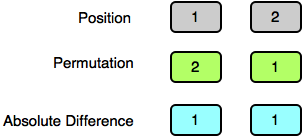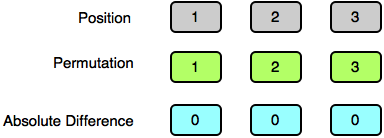
We define P to be a permutation of the first n natural numbers in the range [1, n]. Let pos[i] denote the value at position i in permutation P using 1-based indexing.
P is considered to be an absolute permutation if |pos[i] - i| = k holds true for every .
Given n and k, print the lexicographically smallest absolute permutation P. If no absolute permutation exists, print -1.
Example
n = 4
k = 2
Create an array of elements from 1 to n, pos = [1, 2, 3, 4]. Using based indexing, create a permutation where every |pos[i] - i| = k. It can be rearranged to [3, 4, 1, 2] so that all of the absolute differences equal k = 2:
1 | pos[i] i |pos[i] - i| |
Function Description
Complete the absolutePermutation function in the editor below.
absolutePermutation has the following parameter(s):
- int n: the upper bound of natural numbers to consider, inclusive
- int k: the absolute difference between each element’s value and its index
Returns
- int[n]: the lexicographically smallest permutation, or [-1] if there is none
Input Format
The first line contains an integer t, the number of queries.
Each of the next t lines contains 2 space-separated integers, n and k.
Constraints
- 1 <= t <= 10
- 1 <= n <= 105
- 1 <= k < k
Sample Input
1 | STDIN Function |
Sample Output
1 | 2 1 |
Explanation
Test Case 0:

Test Case 1:

Test Case 2:
No absolute permutation exists, so we print -1 on a new line.
Solution
1 | /* |
